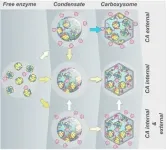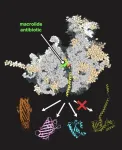Ancient fish bones reveal non-kosher diet of ancient Judeans, say researchers
2021-05-25
(Press-News.org) Ancient Judeans commonly ate non-kosher fish surrounding the time that such food was prohibited in the Bible, suggests a study published in the peer-reviewed journal Tel Aviv.
This finding sheds new light on the origin of Old Testament dietary laws that are still observed by many Jews today. Among these rules is a ban on eating any species of fish which lacks scales or fins.
The study reports an analysis of ancient fish bones from 30 archaeological sites in Israel and Sinai which date to the more than 2,000-year span from the Late Bronze Age (1550-1130 BCE) until the end of the Byzantine period (640 CE).
The authors say the results call for a rethink of assumptions that long-held traditions were the basis for the food laws outlined in the Pentateuch, the first five books of the Hebrew Bible.
"The ban on finless and scaleless fish deviated from longstanding Judean dietary habits", says Yonatan Adler from Ariel University.
"The Biblical writers appear to have prohibited this food despite the fact that non-kosher fish were often found on the Judean menu. There is little reason to think that an old and widespread dietary taboo lay at the root of this ban".
The Old Testament was penned at different times, beginning in the centuries before the destruction of Jerusalem in 586 BCE and into Hellenistic times (332-63 BCE). A set of passages repeated twice forbids the eating of certain species of fish.
The Book of Leviticus states: "Everything in the waters that does not have fins and scales is detestable to you", and Deuteronomy decrees that '...whatever does not have fins and scales you shall not eat; it is unclean for you.'
In both, the references immediately follow a prohibition on 'unclean' pig which has received wide scholarly attention. However, the origins and early history of the seafood ban have not been explored in detail until now.
The authors in this study set out to discover when and how the fish prohibition first arose, and if it was predated by an earlier taboo practiced prior to the editing of the Old Testament passages. They also sought to establish the extent to which the rule was obeyed.
Adler's co-author Omri Lernau from Haifa University analysed thousands of fish remains from dozens of sites in the southern Levant. At many Judean sites dating to the Iron Age (1130-586 BCE), including at the Judean capital city of Jerusalem, bone assemblages included significant proportions of non-kosher fish remains. Another key discovery was evidence of non-kosher fish consumption in Jerusalem during the Persian era (539-332 BCE).
Non-kosher fish bones were mostly absent from Judean settlements dating to the Roman era and later. The authors note that sporadic non-kosher fish remains from this later time may indicate 'some degree of non-observance among Judeans'.
The authors now intend to analyse more fish from around this timeframe to establish when Judeans began to avoid eating scaleless fish and how strictly the prohibition was kept.
INFORMATION:
ELSE PRESS RELEASES FROM THIS DATE:
2021-05-25
Emergency department visits for common conditions such as appendicitis, miscarriage, gallbladder attacks and ectopic pregnancy decreased markedly at the start of the COVID-19 pandemic, but patient outcomes were not worse, found research published in CMAJ (Canadian Medical Association Journal) https://www.cmaj.ca/lookup/doi/10.1503/cmaj.202821.
"These findings are reassuring, as patients who required emergency care in the first wave of the pandemic continued to present to the emergency department, received similar care and had similar outcomes to patients presenting in the prepandemic period," writes Dr. David Gomez, a trauma surgeon at St. Michael's Hospital, Unity ...
2021-05-25
Summary: A new study published by the open access publisher Frontiers shows the usefulness of opportunistically collected specimens, such as stranded carcasses, to study elusive species. The researchers used stable isotope analysis of skin, muscle, and bone tissue of Sowerby's beaked whales to study their spatial ecology. They found that the species exhibits both short- and long-term habitat fidelity. The results are published in Frontiers in Conservation Science and show the importance of such studies for marine wildlife conservation.
A mysterious whale species
Beaked whales, a species of toothed whales, make up more than 25% of extant cetaceans (dolphins, porpoises, and whales), but are elusive and notoriously difficult to study. They live in deep waters and stay away ...
2021-05-25
In a study funded by National Institute for Health Research (NIHR) Maudsley Biomedical Research Centre (BRC) researchers examined whether depression, either before or during pregnancy, affects the mother-infant relationship. The research was published today (Tuesday 25 May) in BJPsych Open.
Researchers looked at the quality of mother-infant interactions eight weeks and 12 months after birth in three groups of women; healthy women, women with clinically-significant depression in pregnancy, and women with a lifetime history of depression but healthy pregnancies.
The study used a sample of 131 women: 51 healthy mothers with no current or past depression, 52 mothers with depression referred to the South London and Maudsley ...
2021-05-25
A team of UBC Okanagan researchers is looking at strategies that could help the homeless during a pandemic.
John Graham, director of UBC Okanagan's School of Social Work, says while many populations have been targeted with guidelines to keep them safe, homeless people have been mostly overlooked.
While this research project began a few years ago, Graham says his team quickly turned their attention to the impact of COVID-19. His team looked at peer-reviewed publications, dating back to 1984, that examined how homeless populations were impacted by other highly contagious or communicable illnesses such as tuberculous, H1NI and Severe Acute Respiratory Syndrome ...
2021-05-25
Researchers from University of Sydney, University of Florida, and Rutgers University published a new paper in the Journal of Marketing that examines the role of serendipity in customer satisfaction and how marketers can provide it.
The study, forthcoming in the Journal of Marketing, is titled "Serendipity: Chance Encounters in the Marketplace Enhance Consumer Satisfaction" and is authored by Aekyoung Kim, Felipe Affonso, Juliano Laran, and Kristina Durante.
Netflix knows you are tired of choice. The streaming service recently introduced what might be the perfect hack: a shuffle button that eliminates choice and plays a randomly selected program for the consumer. Under COVID-19 restrictions, the newly homebound were happy to have so many programming ...
2021-05-25
BINGHAMTON, N.Y. - A team of evolutionary biologists including faculty at Binghamton University, State University of New York have shown that some Anolis lizards, or anoles, have adapted to rebreathe exhaled air underwater using a bubble clinging to their snouts.
Semi-aquatic anoles live along neotropical streams and frequently dive for refuge, remaining underwater for up to 16 minutes. Lindsey Swierk, assistant research professor of biological sciences at Binghamton University, documented this behavior in a Costa Rican anole species in 2019. She had been shocked to see an anole submerge itself for such long periods and used a GoPro underwater to document the behavior.
"It's easy to imagine the advantage that these small, slow anoles gain by hiding from their predators ...
2021-05-25
A new study from the Institute of Psychiatry, Psychology and Neuroscience (IoPPN) at King's College London has established that Intermittent Fasting (IF) is an effective means of improving long term memory retention and generating new adult hippocampal neurons in mice, in what the researchers hope has the potential to slow the advance of cognitive decline in older people.
The study, published today in Molecular Biology, found that a calorie restricted diet via every other day fasting was an effective means of promoting Klotho gene expression in mice. Klotho, which is often referred to as the "longevity gene" has now been shown in this study to play ...
2021-05-25
A study of healthcare workers shows they were three times more likely to become infected during the COVID-19 pandemic compared to the general population. Around one in five of workers who were infected were asymptomatic and unaware they had COVID-19.
The study published in ERJ Open Research [1] also shows that it was not only frontline staff who faced the higher risk, suggesting that there was transmission between staff and within the wider community.
However, health care workers who had been infected were very unlikely to contract COVID-19 a second time in the following six months.
The research was led by Professor James Chalmers, a consultant respiratory physician from the University of Dundee, UK. He said: "We have always believed that front line health workers face a high risk ...
2021-05-24
Rubisco is arguably the most abundant--and most important--protein on Earth. This enzyme drives photosynthesis, the process that plants use to convert sunlight into energy to fuel crop growth and yield. Rubisco's role is to capture and fix carbon dioxide (CO2) into sugar that fuels the plant's activities. However, as much as Rubisco benefits plant growth, it also can operate at a notoriously slow pace that creates a hindrance to photosynthetic efficiency.
About 20 percent of the time Rubisco fixes oxygen (O2) molecules instead of CO2, costing the plant energy that could have been utilized ...
2021-05-24
According to researchers at the University of Illinois Chicago, the antibiotics used to treat common bacterial infections, like pneumonia and sinusitis, may also be used to treat human diseases, like cancer. Theoretically, at least.
As outlined in a new Nature Communications study, the UIC College of Pharmacy team has shown in laboratory experiments that eukaryotic ribosomes can be modified to respond to antibiotics in the same way that prokaryotic ribosomes do.
Fungi, plants, and animals -- like humans -- are eukaryotes; they are made up of cells that have a clearly defined nucleus. Bacteria, on the other hand, are prokaryotes. They are made up of cells, which do not have a nucleus and have a different structure, size and properties. The ribosomes of eukaryotic and procaryotic cells, ...
LAST 30 PRESS RELEASES:
[Press-News.org] Ancient fish bones reveal non-kosher diet of ancient Judeans, say researchers

